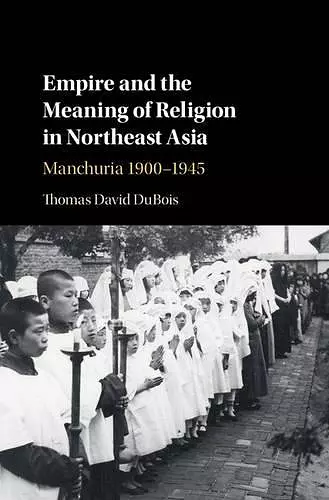Empire and the Meaning of Religion in Northeast Asia
Manchuria 1900–1945
Format:Hardback
Publisher:Cambridge University Press
Published:24th Dec '16
Currently unavailable, and unfortunately no date known when it will be back

This book reveals how religion shaped ideas and propelled the lightning-quick development of Manchuria at the start of the twentieth century.
DuBois shows how religion shaped the commercial, political and social development of a key region of Asia, revealing how many of these changes shaped the global personality of religion as we know it today. It will be of great interest to both scholars and students of Asian history alike.Manchuria entered the twentieth century as a neglected backwater of the dying Qing dynasty, and within a few short years became the focus of intense international rivalry to control its resources and shape its people. This book examines the place of religion in the development of Manchuria from the late nineteenth century to the collapse of the Japanese Empire in 1945. Religion was at the forefront in this period of intense competition, not just between armies but also among different models of legal, commercial, social and spiritual development, each of which imagining a very specific role for religion in the new society. Debates over religion in Manchuria extended far beyond the region, and shaped the personality of religion that we see today. This book is an ambitious contribution to the field of Asian history and to the understanding of the global meaning and practice of the role of religion.
'Few scholars in the world can match DuBois' knowledge of the modern religious and political histories of China and Japan. In this book he applies that knowledge to Manchuria, a state whose history has already revolutionized global historical thinking about relations between tradition and modernity, the national and the cosmopolitan. An impressive new contribution to scholarship on the politics of religion.' Kiri Paramore, Leiden University, author of Japanese Confucianism: A Cultural History
'In this exhilarating and original study of early twentieth-century Manchuria in global context, Thomas DuBois paints a lively picture of the politics and history of spiritual governance in a time and place that seems far removed from our own - but isn't as far as you might think. From an original and provocative account of the Boxer Uprising, to the politics of knowledge generation in Japanese and East Asian social science circles, to the designation of certain groups as 'religious bandits' in the Japanese owned Shengjing Times, to the politics of religious freedom and Protestant and Catholic mission in Japanese colonial Manchukuo, to the emergence of philanthropy as a civic sphere distinct from religion by groups such as the Daoyuan and the World Red Swastika Society, this book never quits. A fascinating, fun and indispensable read for anyone interested in the shifting and entangled fields of spirituality, sovereignty, empire, nationalism, and law.' Elizabeth Shakman Hurd, Northwestern University
ISBN: 9781107166400
Dimensions: 234mm x 160mm x 18mm
Weight: 500g
260 pages